Система упражнений для активизации пассивного залога на уроках английского языка в средней школе.
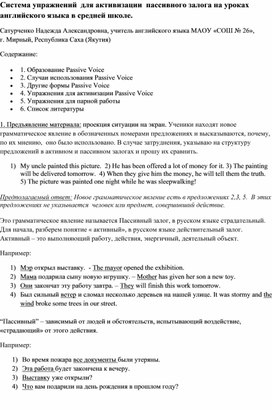
Система упражнений для активизации пассивного залога на уроках английского языка в средней школе.
Сатурченко Надежда Александровна, учитель английского языка МАОУ «СОШ № 26», г. Мирный, Республика Саха (Якутия)
Содержание:
- 1. Образование Passive Voice
- 2. Случаи использования Passive Voice
- 3. Другие формы Passive Voice
- 4. Упражнения для активизации Passive Voice
- 5. Упражнения для парной работы
- 6. Список литературы
1. Предъявление материала: проекция ситуации на экран. Ученики находят новое грамматическое явление в обозначенных номерами предложениях и высказываются, почему, по их мнению, оно было использовано. В случае затруднения, указываю на структуру предложений в активном и пассивном залогах и прошу их сравнить.
1) My uncle painted this picture. 2) He has been offered a lot of money for it. 3) The painting will be delivered tomorrow. 4) When they give him the money, he will tell them the truth. 5) The picture was painted one night while he was sleepwalking!
Предполагаемый ответ: Новое грамматическое явление есть в предложениях 2,3, 5. В этих предложениях не указывается человек или предмет, совершивший действие.
Это грамматическое явление называется Пассивный залог, в русском языке страдательный. Для начала, разберем понятие « активный», в русском языке действительный залог. Активный – это выполняющий работу, действия, энергичный, деятельный объект.
Например:
1) Мэр открыл выставку. - The mayor opened the exhibition.
2) Мама подарила сыну новую игрушку. – Mother has given her son a new toy.
3) Они закончат эту работу завтра. – They will finish this work tomorrow.
4) Был сильный ветер и сломал несколько деревьев на нашей улице. It was stormy and the wind broke some trees in our street.
“Пассивный” – зависимый от людей и обстоятельств, испытывающий воздействие, «страдающий» от этого действия.
Например:
1) Во время пожара все документы были утеряны.
2) Эта работа будет закончена к вечеру.
3) Выставку уже открыли?
4) Что вам подарили на день рождения в прошлом году?
Passive voice in English
|
Tense |
Formula |
Examples |
||
|
Simple |
Continuous |
Perfect |
||
|
Present |
S + am/is/are + V3 S + am not / isn’t/ aren’t + V3 Am/is/are + S + V3?
|
S + am/is/are + being + V3 S + am/is/are not + being + V3 Am/is/are + S + being + V3? |
S + have/has been + V3 S + have/has not been + V3 Have/has + S + been + V3?
|
The house is built /is being built /has been built. The house isn’t built /isn’t being built /hasn’t been built. Is the house built /is it being built /has it been built? |
|
Past
|
S + was/were + V3 S + was not / were not + V3 Was/were + S + V3?
|
S + was/were + being + V3 S + was/were not + being + V3 Was/were + S + being + V3? |
S + had been + V3 S + had not been + V3 Had + S + been + V3? |
The house was built / was being built / has been built. The house wasn’t built / wasn’t being built / hasn’t been built. Was the house built / was it being built / has it been built? |
|
Future |
S + will be + V3
Will + S + be + V3?
|
|
S + will have been + V3 S + will not have been + V3 Will + S + have been + V3? |
The house will be built / -------- / will have been built. The house won’ be built / -------- / won’t have been built. Will the house be built / -------- / will it have been built? |
1. На русский язык переводится:
• Возвратным глаголом на – сь, -ся.
• The experiments are made every day. – Опыты проводятся каждый день.
• Глаголом связкой “быть” и кратким причастием.
• The experiment was made yesterday. – Опыт был проведен вчера.
• Неопределенно - личным предложением.
• She was spoken of at the meeting. – О ней говорили на собрании.
2. We use Passive Voice:
1. When the person/people doing the action is/are unknown, unimportant or obvious from the context.
2. When the action itself is more important than the person/people doing it, as in news headlines, newspaper articles, formal notices, advertisements, instructions, processes, etc.
3. When we want to avoid taking responsibility for an action or when we refer to an unpleasant event and we do not want to say who or what is to blame.
4. To emphasize the agent.
5. To make statements more formal or polite.
3. Some verbs:
Hear, help, make, see are followed by infinitive with “to”. e.g. I was made to lie.
Hear, see, watch can be followed by Participle I (Ving) in the Active and Passive Voices.
We saw her stealing. – She was seen stealing.
4. BY
is used to say who or what carries out an action.
The cake was cooked by my Granny.
WITH is used to say which instrument/ material/ ingredient the agent uses. The bread was cut with a knife.
5. The verbs which take personal object can form passive construction of the following pattern:
|
is smb was smth will be
|
sent for spoken about laughed at
|
||||||||||||||||||
The film was much spoken about.
The doctor was sent for.
6. Mind the place of the preposition in Russian and English
|
Russian |
English |
|
Над ним часто смеются. О нём много говорили.
|
He is often laugh at He was much spoken about |
1. to agree to/with//on/upon - соглашаться с чем-то
2. to arrive at an agreement/a compromise - прийти к соглашению / к компромиссу
3. to arrive at a conclusion/ a decision - прийти к заключению / к решению
4. to call for, on - зайти за
5. to count on - надеяться, рассчитывать на кого-то
6. to deal with - иметь дело с
7. to hear of - слышать о
8. to insist on/upon - настаивать на
9. to interfere with - вмешиваться в, мешать
10. to laugh at - смеяться над
11. to look after - ухаживать за
12. to look at - смотреть на
13. to put up with - примириться с
14. to refer to - ссылаться на
15. to rely on/upon - полагаться на
16. to send for - посылать за
17. to speak about/of, to - говорить о/с
18. to talk about - говорить о
19. to think of - думать о
20. to write about - писать о
21. to find fault with - придираться к
22. to make fun of - насмехаться над
23. to pay attention to - обращать внимание на
24. to take care of - заботиться о
25. to comment on - комментировать
26. to listen to - слушать
27. to look for - искать
28. to operate on - оперировать
29. to provide for - снабжать
30. to lose sight of - потерять из виду
31. to make fool of - дурачить
32. to make use of - использовать
33. to put an end to - положить конец
34. to take (no) notice of - (не) замечать
7. Modal verbs
|
Must / Have to Can / Could / May / Might Need Shall / Should Ought to Will / Would |
+ be + Ved, V3 Present and Future Tenses
|
|
+ have been + Ved, V3 Past Tense |
8. Double object verbs
When we have verbs that take two objects like, for example, give somebody something, we can convert the active sentence into a passive one in two ways:
a. Nelly gave me (indirect object) this book (direct object).
I was given this book by Nelly.
b. This book was given to me by Nelly.
Some of the verbs that take two objects are: give, tell, send, show, bring, write, offer, pay, etc.
When the indirect object is alone after the verb in the passive voice sentence, it needs the preposition to.
e.g. This book was given to me by Nelly.
9. Only the verb which takes on object can go into the passive. Intransitive verbs can’t be used in the Passive voice. They are: to appear, to arrive, to be, to become, to belong, to come, to consist, to deny, to envy, to fit, to forbid, to forgive, to fly, to go, to have, to lack, to last, to order, to pay, to possess, to promise, to refuse, to resemble, to seem, to suit.
· The hall holds 500 people.
· They have a nice house.
· My shoes don’t fit me.
· A lesson lasts 45 minutes.
10. There are sentences in the active having a passive meaning.
· This shirt irons well.
· Your book reads well.
· The walls need whitewashing.
· The door closed and there was silence in the room.
4. EXERCISES
I. Turn the following sentences from Active to Passive. Keep the same tense in each case.
Present Simple Tense
1. The girl rings the bell.
2. Everybody forgets that.
3. The teacher corrects our exercises.
4. Mr. Green controls a big business.
5. The wind blows the clouds away.
6. Does the wind blow the clouds away?
7. Does the girl ring the bell?
Present Continuous Tense
1. Mary is cooking the dinner.
2. Mr. Flint is teaching the class.
3. The soldiers are defending the city.
4. They are examining a new student now.
5. They are sending Mr. Brown abroad.
6. They are moving troops to the battle area.
Present Perfect Tense
1. Somebody has broken the window.
2. The cat has caught a mouse.
3. Somebody has left the electric light on.
4. Most people have heard this story.
5. Has the cat caught a mouse?
6. Have the students finished the exercises?
Past Continuous Tense
1. The waiters were serving the dinner.
2. The wind was blowing the clouds away.
Past Perfect Tense
1. The shot had frightened the birds.
2. Lightning had struck the house.
Future Simple
1. The postman will deliver the letters.
2. Will the postman deliver the letters?
3. I will finish the work tomorrow.
4. We will spend the money.
5. Will they spend the money?
6. People will forget it after some week.
II. Rewrite these sentences in the passive voice.
1. Someone built this house 200 years ago.
2. A thief stole my purse.
3. The police will arrest the robbers.
d. They produce cars in this factory.
4. They serve breakfast at eight o’clock.
5. People throw away tones of rubbish daily.
6. They make coffee in Brazil.
7. Someone stole Jim’s bike lat night.
8. They will build a new bridge next year.
9. Someone found my wallet.
10. One of the students broke the window.
11. They will deliver my computer on Monday.
12. Mary invited Paul to her birthday party.
13. British astronomers discovered a new planet.
III. Form the questions.
a. Paper is made from wood.
Is paper made from wood ?
1. The telephone was invented by Mr Bell.
2. This picture was painted by Peter.
3. The thieves will be arrested by the police.
4. Champagne is made in France.
5. The letters will be sent next week.
6. The animals are fed three times a day.
7. This article was written by Stanley.
8. CDs are made of plastic.
9. The party was organised by Paul.
IV. Turn from Active to Passive in two ways.
1. He gave me a present.
2. The waiter will bring us the bill.
3. Her mother bought Mary some sweets.
4. Bob has sold Ted a second-hand car.
5. Larry is going to send a letter to Tom.
6. The secretary has given Mrs Jones the letters.
7. The parents had already given him a ticket.
8. John gave Elizabeth that beautiful ring.
9. Her students have sent her flowers.
10. We teach our students English and French.
11. They showed the tourists the city sights.
12. They pay her an excellent salary.
V. Transform the following sentences using the passive constructions with the verbs followed by prepositions.
Model: They often laugh at him. ![]() He
is often laughed at.
He
is often laughed at.
1. People speak much of him.
- They will look after the children well.
- Students often refer to these books.
- If they send for you don’t refuse to come.
- I wonder whether they will listen to him.
6. We looked through all advertisements very attentively
7. You can rely upon your guide’s experience.
8. He was very glad that nobody took notice of his late arrival.
9. The audience listened to the speaker with great attention.
10. His friend always found fault with him.
11. They agreed upon the plan.
12. People often ask for this book.
13. My friend always takes care of my little sister.
14. They took no notice of his words.
15. They will not arrive at an agreement.
16. You can depend on her.
17. Many facts accounted for the rise in the price of tin.
18. They may object to your plan.
19. They must comment on this event.
20. You should refer to this quotation more often.
21. We must listen to your teacher very attentively.
22. You must not interfere with them.
23. She should not insist on it.
VI. Выбери предлог ”by” или “with”:
- His novels are read … millions.
- The teacher corrects mistakes … red ink
- The snake was killed … a stone.
- The soup is eaten … a spoon.
- The ground is dug … a spade.
- The ground is dug … boys.
5. COMMUNICATION ACTIVITIES
Ex. 1. Who by? Group work. Match the two columns. Then make a sentence for each, using the passive. Look at the example first.
Example: I think penicillin was discovered by Alexander Fleming.
1. Guernica[gȝ:nikə] a) Margaret Mitchell
2. Radium b) Picasso
3. Penicillin c) Agatha Christie
4. Rashomon d) Steve Jobs
5. Light bulbs e) Madonna
6. Gone with the Wind f) Alexander Fleming
7. Walkman Stereo g) Walt Disney
8. Mickey Mouse h) Sony
9. Material Girl i) Marie Curie
10. War and Peace j) Akira Kurosawa
11. Murder on the Orient Express k) Leo Tolstoy
12. iPhone, iPad l) Thomas Edison
KEY:
1. Guernica b) Picasso
2. Radium i) Marie Curie
3. Penicillin f) Alexander Fleming
4. Rashomon j) Akira Kurosawa
5. Light bulbs l) Thomas Edison
6. Gone with the Wind a) Margaret Mitchell
7. Walkman Stereo h) Sony
8. Mickey Mouse g) Walt Disney
9. Material Girl e) Madonna
10. War and Peace k) Leo Tolstoy
11. Murder on the Orient Express c) Agatha Christie
12. iPhone, iPad d) Steve Jobs
Ex.2. Divide the cards vertically (12 pcs) between 2 students. They ask questions in turn and answer
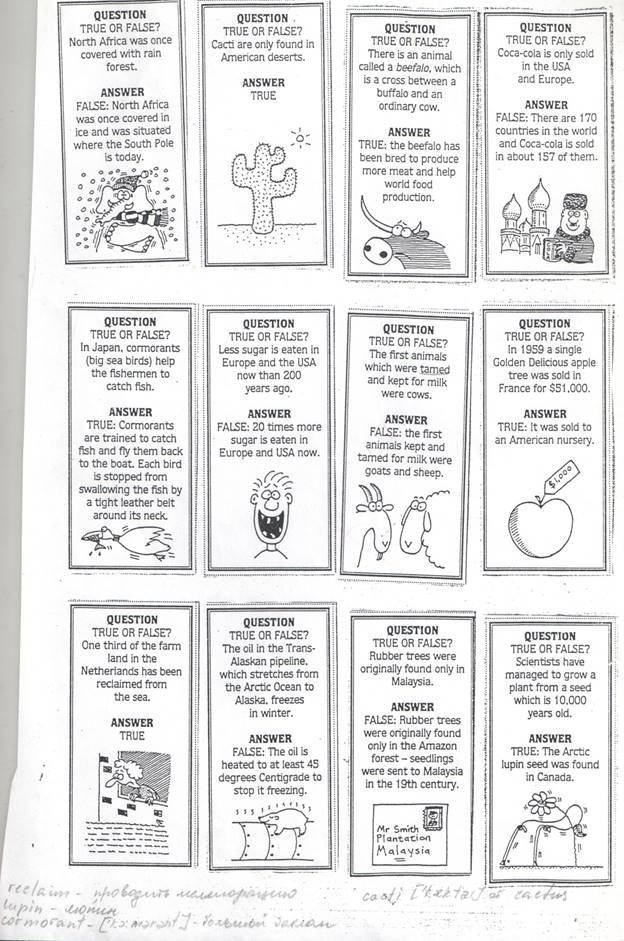
Ex.3.
Define it. Guess an object, use prompts to describe it to your partner who
should solve it.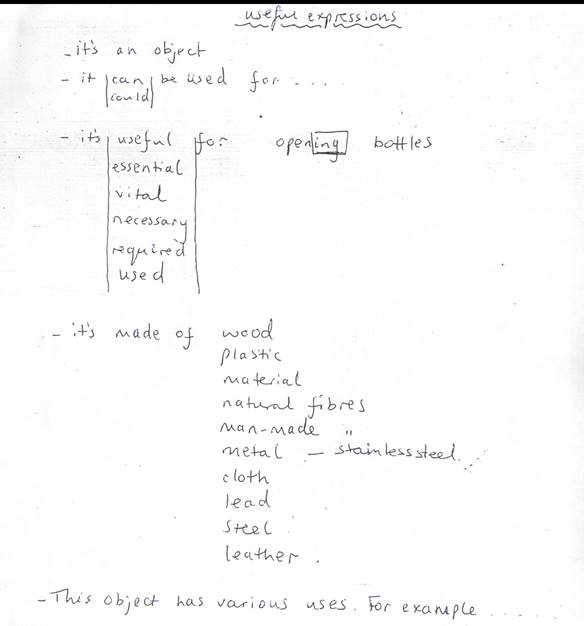
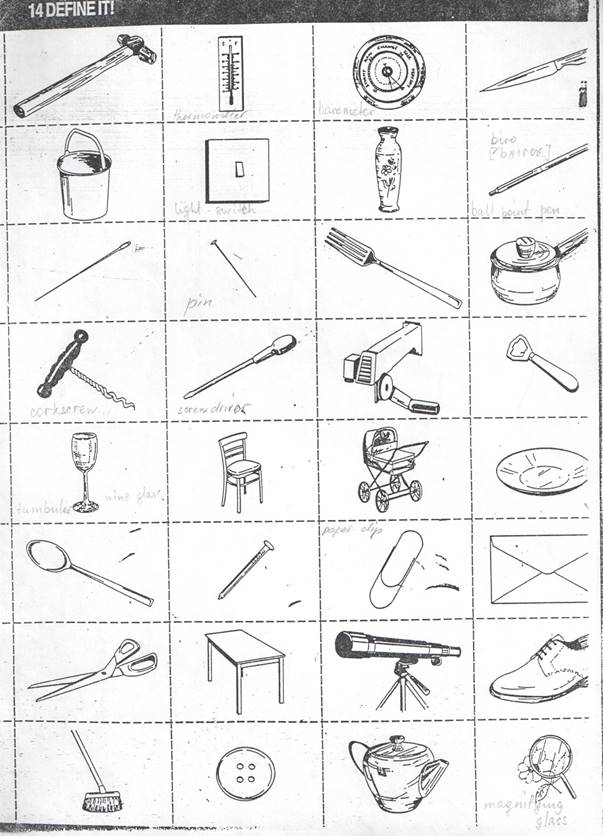
Ex.4.
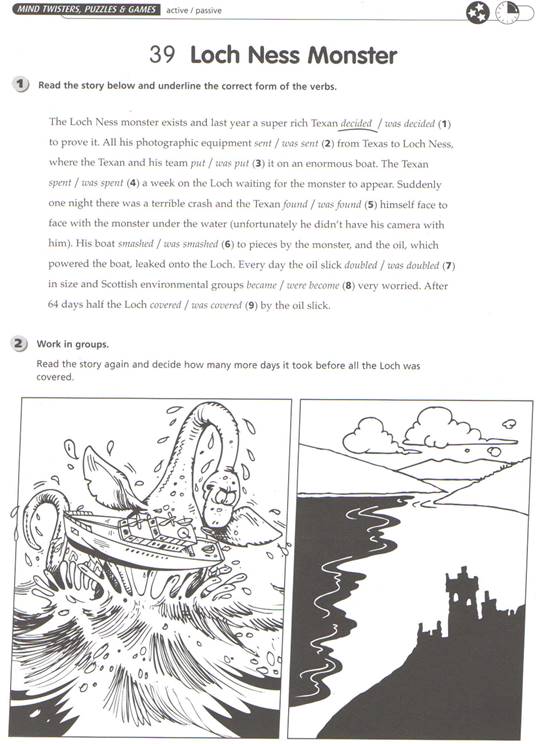
Ex.5. Игра Seabattle. Нарисуйте свои корабли так, чтобы их не видел соперник (3 трех палубных, 4 двухпалубных и 5 однопалубных) Впишите в клеточки правильные грамматические формы, соответствующие обстоятельству времени в данной строке, и сыграйте в морской бой, называя правильную форму глагола. Если вы угадали, вы продолжаете играть, если вы промазали или назвали неправильную форму глагола, ход переходит другому игроку. Делайте комментарии к игре на английском языке! Слова: hit- попал, destroyed - уничтожил, missed - промазал, wrong form – неверная форма
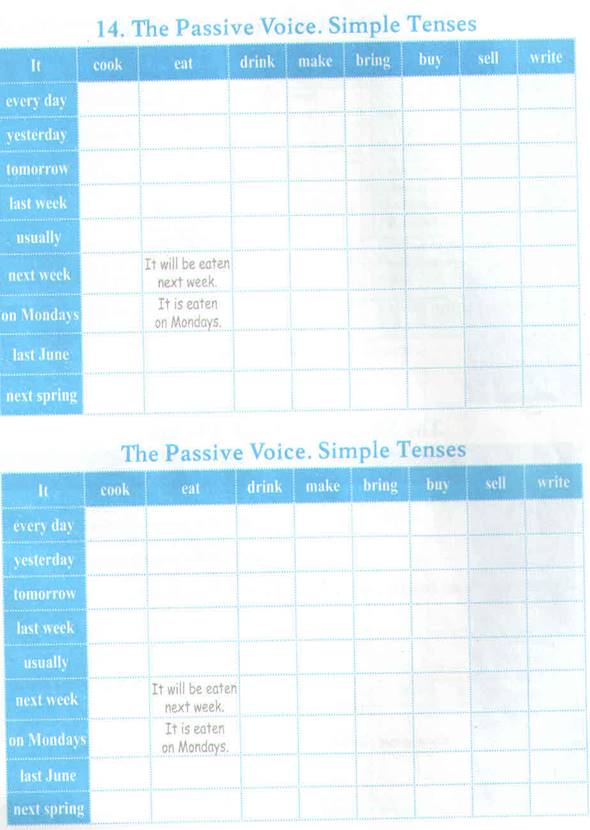
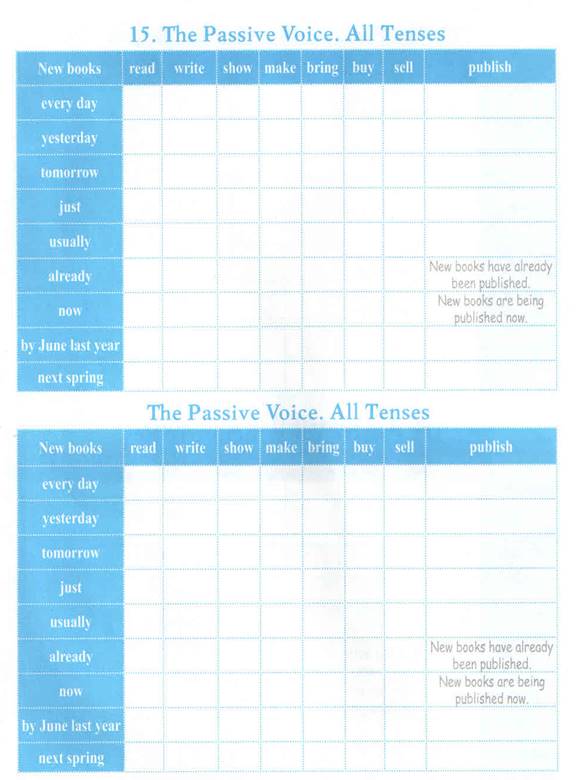
6. CПИСОК ЛИТЕРАТУРЫ
1. Александр Пташкин. - Грамматика английского языка. Страдательный залог. Порядок слов. Фразеологические глаголы.
2. Виноградова Т.В., Яковлева Н.В., Егорова Е.Н.- МГУ СБ. Сборник грамматических упражнений для студентов 1 курса факультета МЭО.
3. Эккерсли К.Э.— Живая грамматика английского языка.
4. Карлова Е.Л. - Grammar Games, Naval Battle, ООО «Феникс», 2014
5. Anna Southern & Adrian Wallwork – Timesaver. Mind Twisters. Puzzles and Games
6. Проект Источник - Школа английского языка Skyeng: https://skyeng.ru/articles/chto-vy-ne-znali-o-passivnom-zaloge-v-anglijskom-yazyke/
© ООО «Знанио»
С вами с 2009 года.
![]()

